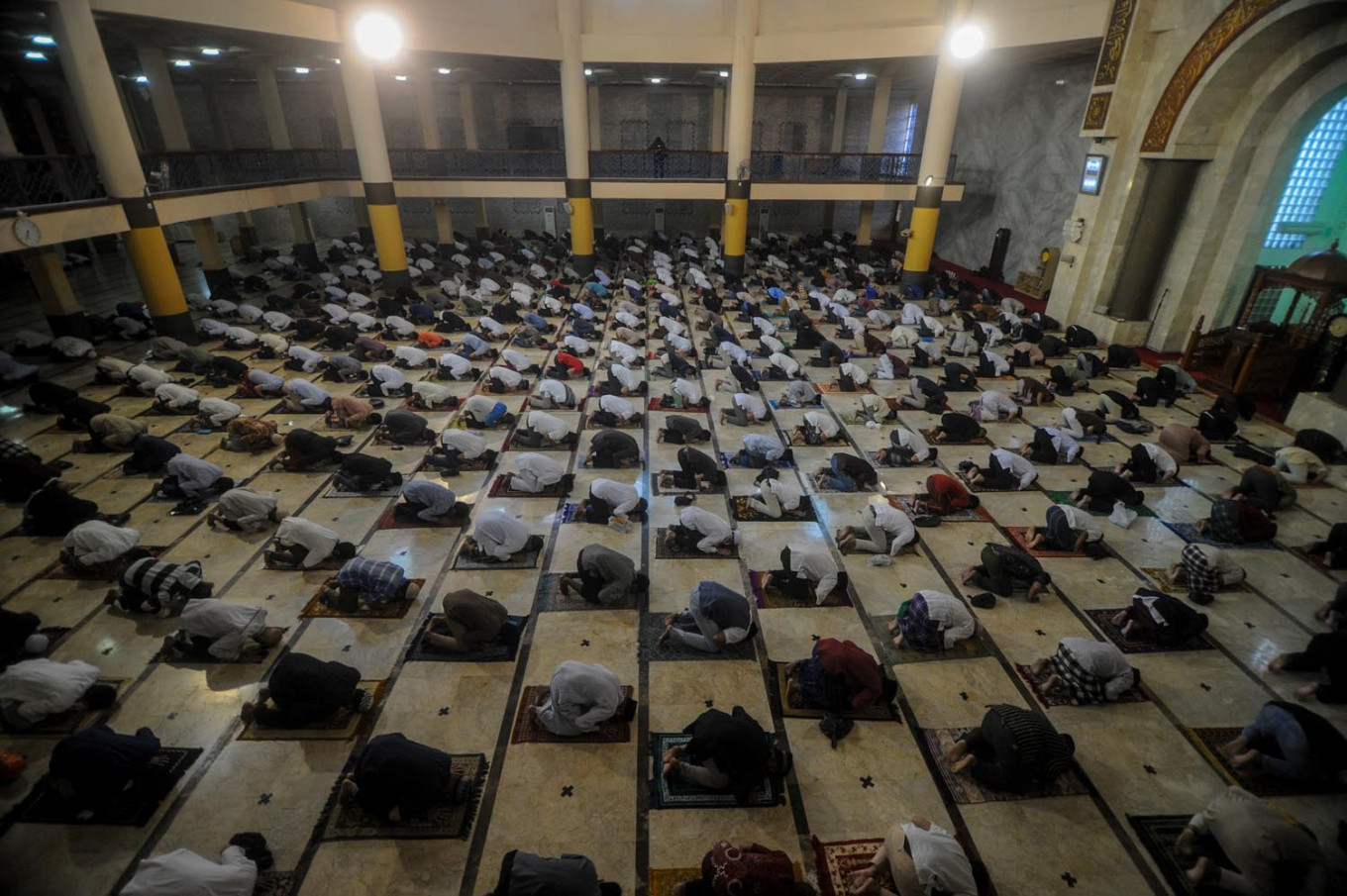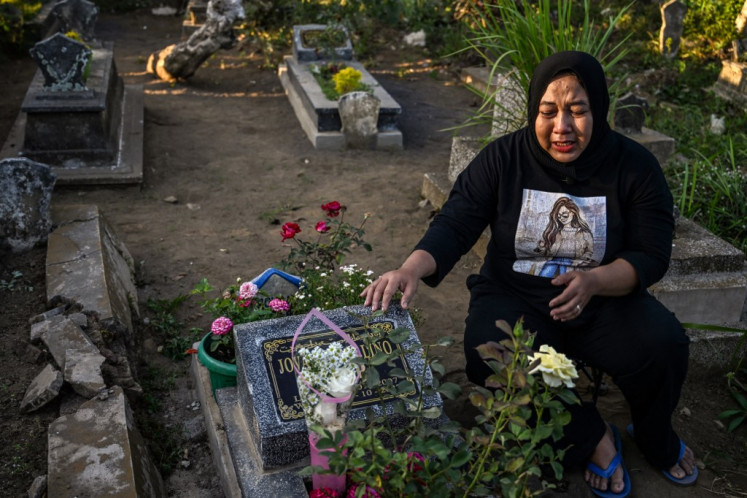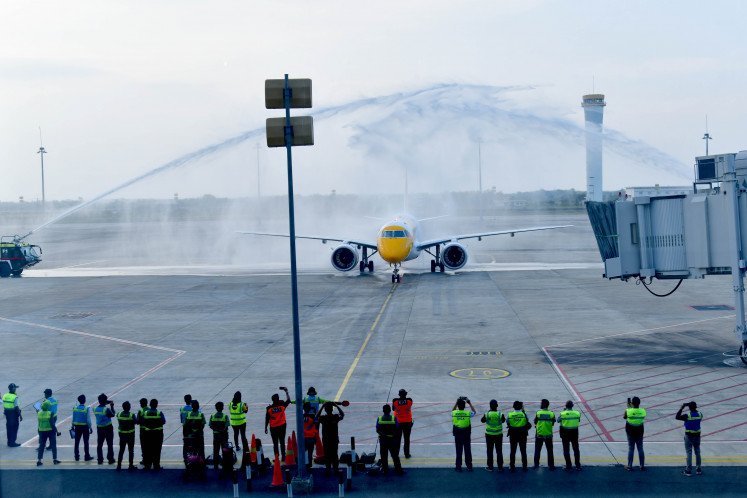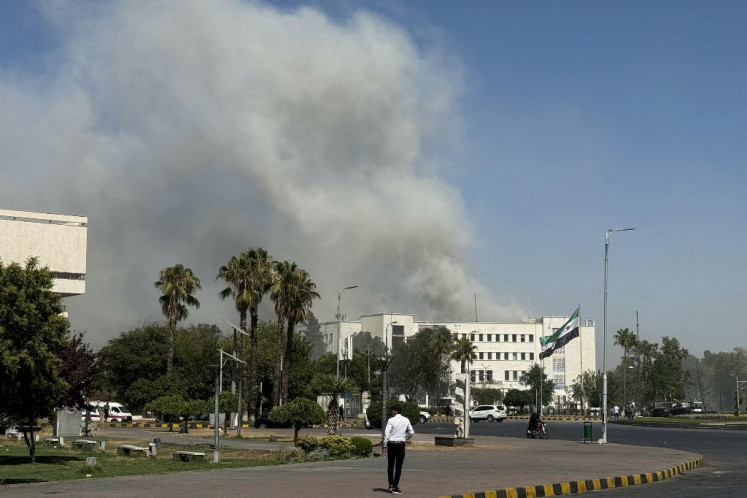Popular Reads
Top Results
Can't find what you're looking for?
View all search resultsPopular Reads
Top Results
Can't find what you're looking for?
View all search resultsGovt bans mass prayers, public celebrations for Idul Adha
Luhut apologizes for state’s pandemic control shortcomings
Change text size
Gift Premium Articles
to Anyone
S
tricken by soaring infections and deaths that have made it Asia’s coronavirus epicenter, Indonesia is seeking to tread a fine line between containing spread of the virus and allowing Muslims to celebrate Idul Adha.
Religious Affairs Minister Yaqut Cholil Quomas has called on people to pray at home during Idul Adha to prevent the virus from spreading, as many fear celebrations could spark another explosion of cases.
“When the government puts out regulations that protect the people, they are mandatory,” he said at a press briefing on Friday.
High mobility and religious gatherings around the Idul Fitri holidays in May were partly blamed for igniting the ongoing outbreak. The country reported a nearly fivefold jump in cases following Idul Fitri, the national COVID-19 task force said on Saturday.
Fueled by the spread of the more infectious Delta variant, the outbreak has strained the country’s healthcare system, with oxygen supplies running low and people dying outside hospitals unable to receive medical attention.
In two circulars issued on July 2, a day before the emergency public activity restrictions (PPKM Darurat) were put in place, the Religious Affairs Ministry banned public Idul Adha celebrations in areas deemed at high risk of COVID-19 infection in and outside of Java.
Muslims residing in regions under PPKM Darurat as well as those in red or orange zones—areas with high or moderate risk of COVID-19 transmission—must refrain from holding activities likely to draw crowds, which are usually part and parcel of Idul Adha festivities, such as mass prayers and takbiran (recitation of God is great).
The Idul Adha qurban (animal sacrifice) ritual, meanwhile, will be conducted in slaughterhouses and, in situations where slaughterhouses are at full capacity, may be done outdoors, but attendance will be strictly limited by the committee in charge of managing the livestock and their donors.
The meat from the slaughtered animals will also be directly delivered to recipients to prevent the formation of crowds.
Clerics resist mosque closure
The decision to ban mass Idul Adha celebrations came after a flurry of mixed signals from the government regarding the closure of houses of worship in regions under PPKM Darurat.
Initially, all houses of worship in these regions, as well as public spaces used for purposes of worship, had been ordered under Home Ministry Instruction No. 15 to close until July 20, the day Muslims celebrate Idul Adha this year. This instruction, serving as a legal basis for the implementation of PPKM Darurat, was issued on the same day as the Religious Affairs Ministry circular.
The closure was reversed after Vice President Ma’ruf Amin received protests from a number of clerics who demanded that the government let mosques stay open, his spokesman Baidowi Masduki told The Jakarta Post on Friday.
After receiving the pushback, Baidowi said, the vice president asked Coordinating Maritime Affairs and Investment Minister Luhut Pandjaitan, who is leading the enforcement of PPKM Darurat on Java and Bali, and Home Minister Tito Karnavian to change the provision.
Tito revised his instruction on July 9, allowing places of worship to stay open, although members of the public are still not allowed to attend mass prayer sessions according to Religious Affairs Ministry rules.
Indonesian Ulema Council (MUI) executive Cholil Nafis said the role of mosques was more essential during the pandemic. They should not be considered only places of worship, he contended, as they also functioned as a means of syiar (spreading values) – as educational centers and social agents in the fight against the virus.
“The government should have consulted with religious leaders when it came to regulating religious affairs,” Cholil said on Friday, adding that he appreciated the reversal.
The change in policy, however, has raised concerns, as mosques in some parts of the country have been packed despite warnings against mass gatherings, AFP reported.
“Muslims put high value on being able to pray at mosques as it means more good deeds,” said Dadi Parmadi, a scholar at Syarif Hidayatullah State Islamic University’s (UIN Jakarta) Center for the Study of Islam and Society (PPIM).
Nahdlatul Ulama (NU), one of the country’s largest Muslim groups, has also urged people to celebrate Idul Adha at home, saying that protecting safety is part of worship.
“We fully support government efforts to protect everyone from the virus,” said NU executive Marsudi Syuhud.
Emergency restrictions to be extended
Experts have said the country is now paying the price for not implementing strict lockdowns or consistent measures during Idul Fitri.
While Coordinating Human Development and Culture Minister Muhadjir Effendy has said the government will extend the PPKM Darurat until July 31, Luhut said on Saturday that the ultimate decision would be announced in two or three days.
Luhut said it was not an easy decision for the government to make, as it was aware that while mobility curbs were necessary to reduce transmission, they had an impact on the economy. He also offered a public apology for the government’s shortcomings in the implementation of PPKM Darurat.
Also on Saturday, national COVID-19 task force spokesperson Wiku Adisasmito said the government was imposing stringent restrictions on public activity and mobility ahead of and during Idul Adha, from July 18 to 25.
Under the task force’s new circular, intercity travel is allowed only for travelers from essential and critical sectors, as well as those who have urgent matters to see to, such as sick patients and pregnant women. In addition to presenting vaccination cards and PCR or antigen test results, travelers must now show letters from institutions justifying their travel.










